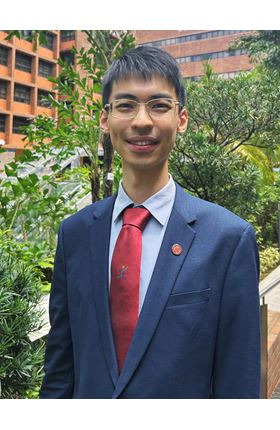Academic Staff


Prof. Jack ZHANG
Assistant Professor
BSc (SCU), MSc (CUHK), PhD (PolyU)
- ST517
- +852 2766 6696
- jack-jiaqi.zhang@polyu.edu.hk
Biography
Prof. Jack Jiaqi Zhang received his BSc in Occupational Therapy from Sichuan University (2016) and his PhD in Rehabilitation Sciences from PolyU (2022). He served as a Research Assistant Professor in the Department of Rehabilitation Sciences from 2023 to 2025. He was also funded as a visiting scholar for a laboratory attachment at RWTH Aachen University, Germany. His research primarily focuses on poststroke neurophysiology and the use of neurotechnology in neurorehabilitation, including non-invasive brain stimulation, closed-loop brain-computer interfaces neurofeedback, digital visual feedback, and assistive robotics. Prof. Zhang has published over 70 articles in reputable peer-reviewed journals, such as Stroke, Brain Stimulation, Journal of NeuroEngineering and Rehabilitation, Addiction, Journal of Neurology, etc. His research projects as PI have received competitive funding support from the National Natural Science Foundation of China, the Health Bureau of the Hong Kong SAR, and the RGC General Research Fund and the Germany/Hong Kong Joint Research Scheme.
Prof. Zhang's research programme focuses on three key areas in rehabilitation sciences:
(1) The role of interhemispheric competition in motor recovery after brain injury
(2) Optimisation of the spatial and temporal precision of motor cortex neuromodulation
(3) Clinical investigations of the effectiveness of innovative neuromodulation protocols for neurorehabilitation
Prof. Zhang is actively looking for research collaborations in the field of rehabilitation technology and neuroscience.
Education and Academic Qualifications
- PhD (Rehabilitation Sciences), The Hong Kong Polytechnic University
- MSc (Neurological Sciences), The Chinese University of Hong Kong
- BSc (Occupational Therapy), West China School of Medicine, Sichuan University
Research Interests
Research Output
(*Corresponding author, #Equal contribution)
- Gong Y#, Lin R#, Mutlu MC, Lorentz L, Shaikh UJ, Graeve JD, Badkoubeh N, Zeng RR, Klein F, Luhrs, M, Mathiak K, Zhang J*, Mehler DMA*. The Use of Functional Near-Infrared Spectroscopy (fNIRS) for Monitoring Brain Function, Predicting Outcomes, and Evaluating Rehabilitative Interventional Responses in Poststroke Patients with Upper Limb Hemiplegia: A Systematic Review. IEEE Journal of Selected Topics in Quantum Electronics. 2025;31(4):6800210.
- Xia AWL, Jin M, Zhang BBB, Kan RLD, Lin TTZ, Qin PP, Wang X, Chau WMW, Shi NMXY, Kannan P, Lu EY, Yuan T, Zhang J, Kranz GS. Investigating the hemodynamic response to iTBS of the left DLPFC: A concurrent iTBS/fNIRS study. Brain Stimulation. 2025;18(2):235-245.
- Zhang J, Bai Z, Fong KNK. Resting-state cortical electroencephalogram rhythms and network in patients after chronic stroke. Journal of NeuroEngineering and Rehabilitation. 2024;21(1):32.
- Zhang J, Bai Z, Sánchez Vidaña DI, et al. Computational simulation of transcranial magnetic stimulation-induced electric fields in the dorsolateral prefrontal cortex of heavy cannabis using individuals. Asian Journal Psychiatry. 2024;93:103963.
- Lin R#, Zhang J*#, Zhong L, Chan SSY, Kwong PWH, Lorentz L, Shaikh UJ, Lam TLH, Mehler DMA, Fong KNK. Does repetitive transcranial magnetic stimulation have a beneficial effect on improving unilateral spatial neglect caused by stroke? A meta-analysis. Journal of Neurology. 2024;271(10):6494-6507.
- Zhang J*#, Zhang B#, Bai Z*, Fong KNK. A comparative study of simulated electric fields of transcranial magnetic stimulation targeting different cortical motor regions. Bioelectromagnetics. 2024;46(1):e22523.
- Wang Y#, Fong KNK#, Sui Y#, Bai Z, Zhang J*. Repetitive peripheral magnetic stimulation alone or in combination with repetitive transcranial magnetic stimulation in poststroke rehabilitation: a systematic review and meta-analysis. Journal of NeuroEngineering and Rehabilitation. 2024;21(1):181.
- Zhang J, Bai Z, Mehler DM, et al. Modulating low-frequency oscillations in post-stroke brains using priming intermittent theta burst stimulation. European Journal of Physical and Rehabilitation Medicine. 2024;60(4):591-593.
- Zhang J*, Bai Z*, Fong KNK. Methodological considerations of priming repetitive transcranial magnetic stimulation protocols in clinical populations. General Psychiatry. 2024;37(1):e101237.
- Bai Z#, Zhang J#, Ti ECH#, et al. Loss of stimulation intensity- and cortical activity-dependent TMS-evoked reactivity in poststroke primary motor cortex. Brain Stimulation. 2024;17(6):1286-1289.
- Bai Z, Zhang J, Fong KNK*. Immediate effects of intermittent theta burst stimulation on primary motor cortex in stroke patients: A concurrent TMS-EEG study. IEEE Transactions on Neural Systems and Rehabilitation Engineering. 2023;31:2758-2766.
- Bai Z, Zhang J, Fong KNK*. Intracortical and intercortical networks in patients after stroke: A concurrent TMS-EEG study. Journal of NeuroEngineering and Rehabilitation. 2023;20(1):100.
- Zhang J, Bai Z, Fong KNK*. Priming Intermittent Theta Burst Stimulation for Hemiplegic Upper Limb After Stroke. Stroke. 2022;53(7):2171-2181.
- Long Y, Ouyang R*, Zhang J. Effects of virtual reality training on occupational performance and self-efficacy of patients with stroke: a randomized controlled trial. Journal of NeuroEngineering and Rehabilitation. 2020;17(1):150.
- Kranz GS*, Zhang J. Expanding the collection of neuroimaging tools in psychiatry. World Journal of Biological Psychiatry. 2018;19(7):482-483.




